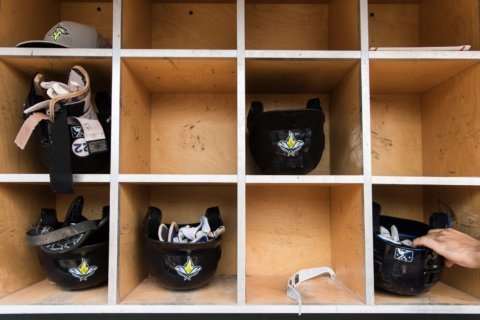WASHINGTON — There’s a brilliant and chilling scene in the movie “Fight Club” that’s stuck with me over the nearly 20 years since the film was released. The main character, who works for a car company, is aboard an airplane, explaining to a stranger about the cost-benefit analyses his company makes after accidents.
If a part fails, they apply The Formula: “Take the number of vehicles in the field, A, multiply by the probable rate of failure, B, multiply by the average out-of-court settlement, C. A times B times C equals X. If X is less than the cost of a recall, we don’t do one.”
It’s morbid, sure, but also illustrative of the cold financial logic we see applied all around American capitalism. And if you found yourself outraged this week about how Major League Baseball could possibly have donated money to the Senate campaign of a white candidate who had just made flippant remarks about public hangings in the Deep South, it’s the answer to why it happened, how the backlash caught the league off-guard, and what to expect in the future.
In case you missed the story, MLB donated $5,000 to Mississippi Sen. Cindy Hyde-Smith’s campaign just days after her remarks surfaced. The league has actually donated $10,000 to her campaign this year, despite the fact that she represents a state with no major-league franchise. The perceived cause-and-effect timeline of the events, to some, sparked outrage, sending the league reeling on the defensive, eventually announcing Wednesday that it will be changing the protocol of its political donations moving forward, without offering specifics.
MLB teams’ public-facing presentations are, increasingly, reflective of the diverse urban environments in which most of them play more and more these days. The Nationals have hosted a Night Out for the entire 14 years the team has been in D.C., which has grown into the largest LGBTQ event in sports, drawing 3,500 people this year. Every team celebrates Jackie Robinson Day. Many have Hispanic Heritage Nights, or Jewish Heritage Nights, or any number of other celebrations of the diversity that lives in their backyard.
That’s not to say that baseball fans are necessarily more progressive, as a result. But as every electoral map shows us, the residents of the cities in which the teams play — who often shoulder the expense of the tax breaks, the infrastructural burdens of traffic and congested public transportation — most certainly are.
Other than the Atlanta Braves (who are owned by Liberty Media and are, actually, a publicly traded stock), MLB teams are not publicly owned entities. But they are a heavily customer-dependent business, and a public-facing representation of the cities and states in which they play, most often content to take public money so long as it serves them.
That makes them more accountable to the general public than most private companies, and deservedly so. Fans aren’t just customers — they’re brand advocates. And their decisions reflect the larger communities within which they live. For an example of this in practice, look no further than the backlash to Washington’s decision to sign Reuben Foster this week.
This is where MLB’s attempt to have it both ways failed this week. The league’s public-facing strategies have become increasingly at odds with their political strategies. That’s the problem with taking an approach toward your business doings in the way that industries that look nothing like baseball and have few of any of its fan-based considerations have done business in Washington for years.
MLB opened its Washington office less than three years ago. It was a clear signal something was changing in the way the league intended to do business. But exactly how that would manifest didn’t take shape until earlier this year, with the introduction of the dead-on-arrival Save America’s Pastime Act, intended to keep minor-league players from being able to earn overtime. The league went to work lobbying and got the bill, untouched, into the back of the omnibus budget passed under the cover of darkness earlier this year.
Naturally well-liked institutions like professional sports teams don’t need lobbyists for popular ideas — they need them for unpopular ones. They need them to convince those in power to do what they did this spring, to slip a law through by using backroom politics.
All of this brings us back to Hyde-Smith. Functionally, it doesn’t matter to MLB what her politics are, or that she doesn’t even have an MLB franchise in her state. A quick look at the congressional roster of those receiving donations this last cycle shows that MLB’s influence spans the political spectrum. The donation to Hyde-Smith’s campaign was about currying favor the same way that any lobbying organization with an interest in a Senate vote (or, at least, a friendly face willing to turn the other way at an opportune moment) acts in America. Many industries get away with it with little or no backlash. MLB certainly thought it could. Now that it understands otherwise, it is re-evaluating.
MLB’s lobbying worked for one bill. But at what cost? That’s what the league has to reckon with. Perhaps the league will decide it’s not worth further alienating its fans to try to save a few million dollars around the edges. Or, perhaps, MLB will let the firestorm blow over and come back to the same conclusion — applying its own cost-benefit formula, deciding to stay in the lobbying business so long as the PR hit isn’t too noticeable.







